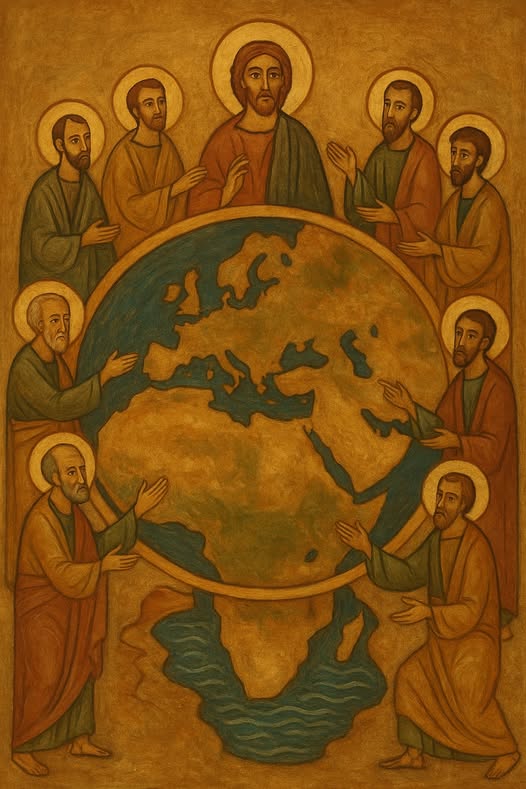
The Book of Acts cannot be rightly understood apart from its ancient backstory. That story begins in Genesis 10, where the descendants of Noah are listed by name and region, forming what scholars refer to as the “Table of Nations.” This genealogical map of the post-flood world symbolically represents the entirety of the Gentile nations known to the biblical authors. Although the Table of Nations appears before the Tower of Babel narrative, the order is thematic rather than chronological. Genesis 10 describes the result, the spread of nations, languages, and territories, while Genesis 11 explains the cause: humanity’s united rebellion against God and His subsequent scattering of them. The two chapters are meant to be read together, with the Table showing what the world became after Babel, and the Tower explaining how it happened.
In that rebellion, humanity attempted to reestablish divine contact apart from Yahweh by constructing a ziggurat, an artificial mountain of assembly. This was not a bid to reach heaven through ambition or height but a ritual effort to draw divine beings down. It was a deliberate rejection of Yahweh as the rightful King and an invitation for other elohim to take His place. The tower was not built to climb to the heavens, but to bring down the spiritual realm on human terms, in defiance of God’s covenantal order. God’s response was not merely to confuse their language and scatter them geographically. It was to disinherit them spiritually. According to Deuteronomy 32:8–9, when the Most High divided the nations, He assigned them under the authority of lesser divine beings while reserving Israel for Himself. This was not a permanent rejection of the nations but a judgment intended to set the stage for their future reclamation. From that point forward, the plan of redemption would move through Abraham and his descendants, ultimately extending Yahweh’s invitation to every nation that had turned away.
Pentecost as the Reversal of Babel
This long-awaited reversal begins in Acts 2 at Pentecost. When the Holy Spirit falls on the disciples and they begin to speak in other tongues, the text goes out of its way to name the regions where the hearers had come from: Parthians, Medes, Elamites, those from Mesopotamia, Judea, Cappadocia, Pontus, Asia, Egypt, Libya, and more. These names are not included as random historical detail.
They are a theological declaration. The nations that had once been scattered at Babel are now being addressed in their own languages as a unified word goes forth: the risen Christ now reigns. Babel had divided humanity through language as judgment.
Pentecost unites them through the Spirit in redemption. The message of Jesus crucified and raised is now being heard by representatives of all the major peoples from the Table of Nations, encompassing the descendants of Shem, Ham, and Japheth alike. What was once dispersed is now being drawn back to the one true King.
The Mission of Acts: Reclaiming the Nations
As the narrative of Acts unfolds, the Gospel begins to cross boundaries: ethnic, geographic, religious, and spiritual. The pattern follows the framework laid out by Jesus in Acts 1:8, first Jerusalem, then Judea and Samaria, and finally the ends of the earth. But this progression is more than geographical. It is theological. The nations once handed over to other elohim are being taken back. When the Gospel reaches Samaria, it reclaims the fractured remnant of Israel’s northern kingdom. When Philip baptizes the Ethiopian eunuch, the message reaches into the territory of Cush, one of Ham’s sons.
When Peter preaches to Cornelius, a Roman centurion, Japheth’s line is brought in. Paul’s journeys then stretch into Asia Minor and Macedonia, territories populated by the descendants of Javan, Gomer, and Magog. Each stop is more than a mission strategy. It is a spiritual act of war. The Gospel is invading enemy territory, undoing what had been imposed at Babel and declaring that the Most High is reclaiming His inheritance.
Rome and the Cosmic Shift in Authority
Luke’s narrative takes special care to show Paul’s path leading to Rome. Though Jerusalem remains central at the start, by the end of the book the center of action has shifted dramatically. Rome was the seat of imperial power, a city that represented the full weight of Gentile authority and the culmination of human kingdoms. That the Gospel reaches Rome is no small detail. It signals that the message of Christ has arrived in the heart of the Gentile world and has not been silenced. Though Paul is imprisoned, the Word of God is not. He preaches the kingdom of God and the things concerning the Lord Jesus Christ with all boldness and without hindrance. This closing line is not a loose thread. It is a thunderclap. The powers of the nations have been confronted, and they have not prevailed.
Spain and the Completion of the Mission
Yet even Rome is not the terminus of Paul’s vision. In his letter to the Romans, written shortly before his final journey, Paul reveals his intention to go further still, to Spain. This was not a casual ambition. Spain represented the western edge of the known world, the final horizon of the Greco-Roman imagination. To reach Spain was, symbolically, to fulfill the promise of Acts 1:8 and bring the Gospel to the ends of the earth. Paul writes with urgency and finality, saying that he has no more room for work in the eastern regions and that he longs to go where Christ has not yet been named.
This was not only a matter of geography but of theological conviction. Paul believed he was fulfilling the prophetic vision of the fullness of the Gentiles coming in, as described in Romans 11. In his understanding, this meant the reclamation of the nations listed in the Table of Nations, the peoples who had been disinherited at Babel and placed under the authority of lesser elohim. Paul hoped that when these Gentile nations turned to the God of Israel through the Gospel, it would stir his fellow Jews to jealousy and lead them to recognize Jesus as the Messiah. He saw his mission not only as reaching the lost among the nations but as paving the way for the restoration of Israel.
What Paul could not yet know was that there were vast continents and civilizations beyond the scope of the ancient world. The Americas, Sub-Saharan Africa, the Far East, and the Pacific peoples lay entirely outside the biblical worldview he had inherited. His vision was faithful and immense, but it was still bounded by the map of the world as he knew it. Yet the pattern he followed was precisely the one God had ordained. The Gospel would first reclaim the nations judged at Babel, beginning with those listed in Genesis 10. It was not the end of the mission, but it was the beginning of the end.
While Acts ends with Paul in Rome, early Christian tradition holds that he did in fact make it to Spain after his first imprisonment. Whether or not Luke includes the journey, the arc is already complete. The Gospel has traveled from Babel to the furthest edge of the Gentile world. The message of Yahweh’s enthroned Son has crossed the ancient boundaries of rebellion and declared amnesty and allegiance to all peoples.
Theological Fulfillment and Ongoing Call
Acts is not merely a story of the church’s birth. It is the first act of a larger drama in which Yahweh reclaims the world that had once turned away from Him. The movement of the Gospel in Acts mirrors and reverses the division of Genesis 10 and 11. It does not name every nation, but it touches enough of them, symbolically, strategically, and theologically, to represent the whole. What was disinherited is being invited back in.
The Gospel is not just about personal salvation, but cosmic restoration. It is the announcement that the Most High has sent His Son not only to save individuals, but to reclaim territory, allegiance, and worship from the gods who ruled unjustly. Every city entered, every convert baptized, every opposition overcome is a skirmish in this greater war, a war that ends with all nations under one Name.
Conclusion
The Book of Acts is not just the story of how the church expanded. It is the blueprint for how God began taking back what had been lost. The nations listed in Genesis 10, once placed under false rulers after Babel, are now hearing the voice of their true King. From Jerusalem to Samaria, from Cush to Rome, and ultimately to Spain, the Gospel moves like a tide reclaiming sacred ground. Pentecost reversed Babel. Paul’s mission fulfilled Abraham’s promise. And the church’s call today still follows that same path, to carry the Name of Christ to the ends of the earth, until every nation that once turned away hears the call to return.
Discussion Questions
- How does understanding the thematic rather than chronological arrangement of Genesis 10 and 11 change the way we interpret the nations listed in the Table of Nations?
- In what ways does the construction of the ziggurat at Babel reflect a spiritual rebellion rather than mere human pride or ambition?
- How does Pentecost serve as a direct reversal of Babel, and what does that reveal about God’s intention for the nations?
- Why did Paul believe he was fulfilling the “fullness of the Gentiles,” and how does that help us understand the boundaries of his mission in light of the Table of Nations?
- What implications arise from the fact that Paul did not yet know about peoples outside the biblical world, and how should that inform the church’s ongoing mission today?
Want to Know More?
- Michael S. Heiser – The Unseen Realm: Recovering the Supernatural Worldview of the Bible
This foundational work explores the divine council worldview, the disinheriting of the nations at Babel, and how Acts fits into the larger biblical story of God reclaiming the nations through Jesus the Messiah. - John B. Polhill – Acts (New American Commentary Series)
A detailed and highly respected commentary on the Book of Acts, Polhill’s work provides both historical context and theological insight, including how the spread of the Gospel mirrors the Table of Nations. - Christopher J. H. Wright – The Mission of God: Unlocking the Bible’s Grand Narrative
Wright shows how the entire Bible, including Acts, is centered on God’s redemptive mission to the nations. His analysis of Genesis 10, Babel, and the Abrahamic promise brings valuable clarity to the theology of Acts. - Eckhard J. Schnabel – Paul the Missionary: Realities, Strategies and Methods
Schnabel traces Paul’s journeys, including his stated intent to reach Spain. This book grounds Paul’s mission work in both historical and theological terms and reinforces the pattern of reclaiming the Gentile world. - G. K. Beale – A New Testament Biblical Theology: The Unfolding of the Old Testament in the New
Beale explores how New Testament writers, especially Luke and Paul, understood the fulfillment of Old Testament themes. His treatment of Acts within the broader biblical-theological framework reinforces its connection to Genesis 10 and the cosmic scope of redemption.





